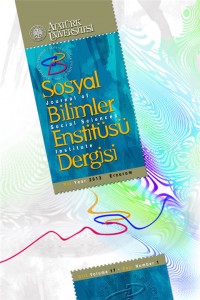Abstract
Yabancı bir dil olarak İngilizce ders kitapları ile ilgili çalışmalar, dil becerilerinin
sunulmasına yönelik öğretmen algılarından çok, çoğunlukla dil ve iletişim becerilerinin
sunumu üzerine odaklanmışlardır. Bu nedenle mevcut çalışma, aday öğretmenlerin bir
ders kitabındaki temel dil becerilerini nasıl algıladıklarını incelemeyi amaçlamaktadır.
Çalışmanın örneklem grubu, 48 İngilizce öğretmeninden oluşmuş, Spot on 8 on adlı kitapta
dil becerilerinin sunumuna yönelik algıları ölçmek için bir anket kullanılmıştır.
Araştırma sorusuna bağlı olarak, veri, betimsel olarak analiz edilmiştir. Sonuçlar, aday
öğretmenlerin, temel dil becerilerinin sunumuna yönelik olumlu algılara sahip olduklarını,
ancak konuşma becerileri ile ilgili bazı sorunlar olduğunu göstermiştir.
References
- Alwan, F. H. (2006). An analysis of English language teachers’ perceptions of curriculum change in the United Arab Emirates. (Unpublished Ph.D. Dissertation). Exeter: Exeter University.
- Arıkan, A. (2005). Age, gender and social class in ELT course books: A critical study. Hacettepe University Journal of Education, 28, 29-38.
- Arıkan, A. (2007). An analysis of English language teaching course books by Turkish writers: “Let’s Speak English”. Example. International Journal of Human Sciences, 4(2), 1-18.
- Arıkan, A. (2008). Topics of reading passages in ELT course books: What do our students really read? The Reading Matrix, 8(2).
- Arıkan, A. (2009). “Problems with course books in EFL classrooms: Prospective teachers’ opinions”. EKEV Academic Review, 38(1), 309-317.
- Criado, R. & Sanchez, A. (2009). “English language teaching in Spain: do textbooks comply with the official methodological regulations? A sample analysis”. International Journal of English Studies, 9(1), 1-28.
- Demir, S. (2008). An evaluation of thinking skills in ELT course books at primary and secondary levels: Teachers’ point of view. (Unpublished MA Thesis). Adana: Çukurova University.
- Gilmore, A. (2004). A comparison of textbook and authentic interactions. ELT Journal, 58(4), 363-374.
- Harmer, J. (1991). The practice of English language teaching. New York: Longman Publishing.
- Kayapınar, U. (2009). “Course book evaluation by English teachers”. Inonu University Journal of the Faculty of Education, 10(1), 68-78.
- Lai, F. E. (1994). “Teachers’ views on ways of improving English language teaching in Hong Kong”. Paper Presented at the Annual International Language in Education Conference.
- Lee, R. N., & Bathmaker, A. M. (2007). “The use of English textbooks for teaching English to “vocational” students in Singapore secondary schools”. RELC Journal: A Journal of Language Teaching and Research, 38(3), 350-374.
- Nitta, R. & Gardner, S. (2005). “Consciousness-raising and practice in ELT course books”. ELT Journal, 59(1), 3-13.
- Oscarson, A. D. (2009). “Self-assessment of writing in learning English as a foreign language”. Goteborg Studies in Educational Sciences, 277, Goteborg University.
- Rivas, R. M. M. (1999). Reading in recent ELT course books. ELT Journal, 53(1), 12- 21.
- Sarıçoban, A. (2010). “Problems encountered by student-teachers during their practicum”. Procedia Social and Behavioral Sciences, 2, 700-711.
- Sert, N. (2008). “The language of instruction dilemma in the Turkish context”. System: An International Journal of Educational Technology and Applied Linguistics, 36(2), 156-171.
Abstract
References
- Alwan, F. H. (2006). An analysis of English language teachers’ perceptions of curriculum change in the United Arab Emirates. (Unpublished Ph.D. Dissertation). Exeter: Exeter University.
- Arıkan, A. (2005). Age, gender and social class in ELT course books: A critical study. Hacettepe University Journal of Education, 28, 29-38.
- Arıkan, A. (2007). An analysis of English language teaching course books by Turkish writers: “Let’s Speak English”. Example. International Journal of Human Sciences, 4(2), 1-18.
- Arıkan, A. (2008). Topics of reading passages in ELT course books: What do our students really read? The Reading Matrix, 8(2).
- Arıkan, A. (2009). “Problems with course books in EFL classrooms: Prospective teachers’ opinions”. EKEV Academic Review, 38(1), 309-317.
- Criado, R. & Sanchez, A. (2009). “English language teaching in Spain: do textbooks comply with the official methodological regulations? A sample analysis”. International Journal of English Studies, 9(1), 1-28.
- Demir, S. (2008). An evaluation of thinking skills in ELT course books at primary and secondary levels: Teachers’ point of view. (Unpublished MA Thesis). Adana: Çukurova University.
- Gilmore, A. (2004). A comparison of textbook and authentic interactions. ELT Journal, 58(4), 363-374.
- Harmer, J. (1991). The practice of English language teaching. New York: Longman Publishing.
- Kayapınar, U. (2009). “Course book evaluation by English teachers”. Inonu University Journal of the Faculty of Education, 10(1), 68-78.
- Lai, F. E. (1994). “Teachers’ views on ways of improving English language teaching in Hong Kong”. Paper Presented at the Annual International Language in Education Conference.
- Lee, R. N., & Bathmaker, A. M. (2007). “The use of English textbooks for teaching English to “vocational” students in Singapore secondary schools”. RELC Journal: A Journal of Language Teaching and Research, 38(3), 350-374.
- Nitta, R. & Gardner, S. (2005). “Consciousness-raising and practice in ELT course books”. ELT Journal, 59(1), 3-13.
- Oscarson, A. D. (2009). “Self-assessment of writing in learning English as a foreign language”. Goteborg Studies in Educational Sciences, 277, Goteborg University.
- Rivas, R. M. M. (1999). Reading in recent ELT course books. ELT Journal, 53(1), 12- 21.
- Sarıçoban, A. (2010). “Problems encountered by student-teachers during their practicum”. Procedia Social and Behavioral Sciences, 2, 700-711.
- Sert, N. (2008). “The language of instruction dilemma in the Turkish context”. System: An International Journal of Educational Technology and Applied Linguistics, 36(2), 156-171.
Details
| Primary Language | en;tr |
|---|---|
| Journal Section | Makaleler |
| Authors | |
| Publication Date | April 26, 2013 |
| Published in Issue | Year 2012 Volume: 16 Issue: 3 |



